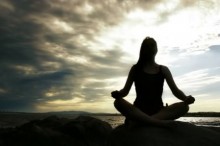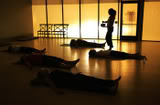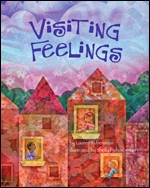 Family matters both celebratory (my daughter’s approaching marriage) and life-threatening (my brother’s 3rd collapse in 9 months), as in all of our lives, slowed down the production of this newsletter. It has been two months since I published this research and news report from LifeForce Yoga. In that time, there have been some terrific studies that show the benefits of a meditative style of yoga for breast cancer survivors, for insomnia, and for general improvement in mood. I’ve also had the opportunity to read Dr. Lauren Rubenstein’s wonderful new book for kids and those who love them called Visiting Feelings.
Family matters both celebratory (my daughter’s approaching marriage) and life-threatening (my brother’s 3rd collapse in 9 months), as in all of our lives, slowed down the production of this newsletter. It has been two months since I published this research and news report from LifeForce Yoga. In that time, there have been some terrific studies that show the benefits of a meditative style of yoga for breast cancer survivors, for insomnia, and for general improvement in mood. I’ve also had the opportunity to read Dr. Lauren Rubenstein’s wonderful new book for kids and those who love them called Visiting Feelings.
As we move through this transitory season of change, I hope you will commit to practice something every day to clear your inner space, so that, even if it’s only for a moment, you have a glimpse of your own true and unsullied nature.
- Research: Meditative Styles of Yoga Have Greatest Effect on Mood
- Research: Yoga Beneficial for reducing Insomnia and Improving Sleep (2 Studies)
- Review: Visiting Feelings by Lauren Rubenstein, illustrated by Shelley Hehenberger
- Events: Tucson LifeForce Yoga Practitioner Training
- Events Calendar
Research: Meditative Styles of Yoga Have Greatest Effect on Mood
In a recent study, published in the journal Depression and Anxiety in August, researchers found that the types of yoga that seemed to have the greatest effect on improving depression were meditation-based types. Meditation-based types of yoga might include various styles of hatha yoga like Kripalu, Integral, Viniyoga, restorative yoga, and of course, LifeForce Yoga.
This study, conducted at the Department of Internal and Integrative Medicine at University of Duisburg-Essen in Germany, searched five medical research databases through January 2013 for all randomized controlled trials related to yoga and depression. The researchers identified 12 studies that involved a total of 619 participants, though only three of the studies were consideredexceptionally high quality. In the randomized, controlled trials, depressed participants using yoga were compared to depressed participants doing nothing different (usual care), using aerobic exercise or using relaxation methods.
The results of all the studies together revealed that the short-term effects of yoga appeared to improve the symptoms of patients with depression when compared to patients receiving only usual care. When compared to depressed patients using relaxation and aerobic exercise, depressed patients using yoga also appeared to have greater improvements in their symptoms, though this evidence was not as strong. Patients with a diagnosed depressive disorder or with particularly higher levels of depression were more likely to see the benefits of yoga, based on these studies’ findings.
The researchers also found limited evidence that yoga helped decrease the symptoms of anxiety in patients when compared to using only relaxation methods. In my experience in working with students and clients, I have found this to be true. People with rajasic mood-mind state (anxiety) seem to benefit most from a physical practice, even a simple chair practice that includes attention to sensation and breath,before they engage in relaxation methods like yoga nidra. As this research indicates, meeting the anxiety (rajasic state) with a more active practice may be more effective than beginning with a relaxation technique. A more active practice, followed by yoga nidra or another form of relaxation/meditation, helps the busy mind begin to calm down and releases the body’s tension so that relaxation is easier to achieve. To read the abstract and for more information please click here.
Research: Yoga Beneficial for reducing Insomnia and Improving Sleep (2 Studies)
Two recently published articles reveal that yoga is beneficial for insomnia in both pre and post menopausal women. The first study,  documented in the Journal of Clinical Oncology revealed the benefits of yoga on cancer survivors. Practicing yoga helped participants who have had cancer sleep better and reduce their use of sleep aids.
documented in the Journal of Clinical Oncology revealed the benefits of yoga on cancer survivors. Practicing yoga helped participants who have had cancer sleep better and reduce their use of sleep aids.
Researchers from the James P. Wilmot Cancer Center at the University of Rochester Medical Center in New York found study participants, mostly women with a history of breast cancer, reported significant improvements in sleep quality and sleep duration when they attended yoga sessions twice per week over a four week period.
The study included 410 people with a history of cancer who were recruited from 12 U.S. cities. Participants were 54 years old, on average. Almost all were white and female, and three quarters had had breast cancer. Participants were randomly assigned to one of two groups. Half of them attended a standardized yoga program for cancer survivors that met for 75 minutes twice a week, in addition to receiving standard care. The other half received only standard care.
In addition to a participant before and after questionnaire that assessed sleep quality, researchers used actigraphy, a sensor that detects movement and is worn like a wristwatch at night. Yoga participants reduced their use of sleep medication by 21 percent per week, on average, and those not assigned to yoga increased use of sleep aids by five percent per week. For more information click here.
In the second study, conducted at the Group Health Research Institute, researchers showed that a 12-week yoga class and practicing the same at home resulted in reduced insomnia. But yoga practice did not seem to reduce hot flashes or night sweats among menopausal women.
During menopause twice as many women suffer from insomnia that not only affects the quality of life but also lowers a person’s memory and concentration. Insomnia, depression and sleep apnea are common problems that women start facing before the onset of menopause.
“Many women suffer from insomnia during menopause, and it’s good to know that yoga may help them,” said the study’s author, Dr. Karen Newton. Researchers concentrated on the effects of three natural approaches namely yoga, fish oil and exercise on menopausal symptoms.
The study was conducted on 249 healthy women divided into three groups -one who performed yoga, a moderate aerobic exercise program group and one control group, which did no exercises. The groups were also randomly given omega-3 fatty acid supplement or a placebo. The yoga group had a statistically high compliance rate, which translates to the assumption that the womenin the study enjoyed their yoga practice!
The researchers noticed that exercise slightly improved sleep, insomnia and depression whereas yoga was associated with better sleep quality and less depression but the effects were not statistically significant. The intake of omega 3 did not improve hot flashes, night sweats, mood and sleep.
Similar to the latest finding, a previous study published in the journal Menopause revealed that a couple of yoga sessions a week ease sleeping problems and associated climacteric problems (Symptoms associated with menopause) in postmenopausal women insomnia. To read the full study click here.
Review: Visiting Feelings by Lauren Rubenstein, illustrated by Shelley Hehenberger
I’ve just read a gem of a children’s book that is designed to increase emotional awareness and mindfulness in children between the ages of 4-8. If you are a fan of Rumi’s “Guest House” poem, and, like me, believe that “the only way out is through” difficult emotions, then make way for Visiting Feelings. This lyrically illustrated beauty of a book is the doorway into accepting feelings that arise and accepting oneself for experiencing those feelings. From the first page through the last, a light-hearted, rhyming poem encourages the young reader to welcome and listen to feelings, as though they are visitors, inquiring into shape, color image,location in the body, and the origin of the feeling. In the author’s note to parents, she includes activities adults and children can do together to increase meaning and connection between them, along with breathing and self-awareness exercises.
Written by a psychologist and yoga teacher, this book belongs on the shelf of everyone who serves children—parents, grandparents, therapists, aunts, uncles and teachers.
All proceeds from the book will be donated to Go Give Yoga, a non-profit for Haitian children that Dr Rubenstein supports that teaches Haitian educators how to incorporate yoga into their work with children. Dr. Rubenstein herself also works with a teen girls’ empowerment group at the YWCA in Port au Prince.
To purchase a copy of Visiting Feelings please click here.
Events: Tucson LifeForce Yoga Practitioner Training
Join us in Tucson, January 12 – 19, 2014, for the LifeForce Yoga Practitioner Training – Level 1, for yoga teachers, therapists and other mental health professionals. Participants will experience evidence-based practices for mood management. Each day begins with an early morning practice of yoga, meditation, breathing practices and chanting. The day continues with two 3 hour sessions with a midday break to enjoy the warm Arizona desert or get a message. CEUs (NASW, Yoga Alliance). Registration details
Events Calendar
View our latest schedule of Workshops and Trainings. including upcoming workshops in Tucson and a LifeForce Yoga Thanksgiving retreat at Kripalu.